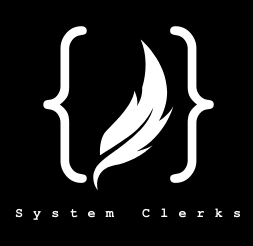System Clerks
Why System Clerks and not IT or System Administrator. The website and organisation are named System Clerks as it more aptly describes what we do, and what people working in information systems have done for thousands of years. It doesn't matter if a system is verbal, writen in stone or on paper or uses a computer as long as it supports what the business needs. Even if an individuals work is restricted to systems on computers this system must interface effectively with all of the other systems used by the organisation, the partners, and the customers in order to deliver what is wantened and often expected. It also doesn't matter how an organisation manages to continue doing business after a disaster, even if a process reverts to pen and paper or peoples memory as far as the people awaiting rescue, citizens accessing public services,or customers of a business which still has customers after a disaster are concerned it matters whether the organisation continues to deliver goods or services or not. Similarly it doesnt matter to organisations, or data subjects be they citizens, customers, or however they are related to the organisation if a security breach exposing their personal or confidental data was achieved by expert computer programing or tricking someone into doing something they should not. It only matters whetehr their information was kept secure or not.
This is nothing new people have been doing business and writing about it since at least 3000 BCE. Stone Tablets in cuneiform from that time mostly represented accounts (Englund, 2004). At this time most societies were feudal and remained so for milennia. These feudal societies with dynastic rulers none the less needed to feed people pay soldiers and gather taxes or tribute to religeous organisations and the ruler(s). So they had a system of accounts written in clay in the beginning. This cuneiform alongside Egyptian Hyroglyphs persisted for thousands of years until the second century AD (Adkins, 2003). There were even concerns about authentication and forgery leading to the development of cylinder seals. In these societies the systems of writing and accounting supported the systems of agriculture religeon and warfare.
References
1. Robert K. Englund, "Proto-Cuneiform Account-Books and Journals", in Michael Hudson and Cornelia Wunsch, eds., Creating Economic Order: Record-keeping, Standardization and the Development of Accounting in the Ancient Near East (CDL Press: Bethesda, Maryland, USA) pp. 23–46, 2004
2. Lesley Adkins, "Cuneiform and the Bible", p.47, 2003
